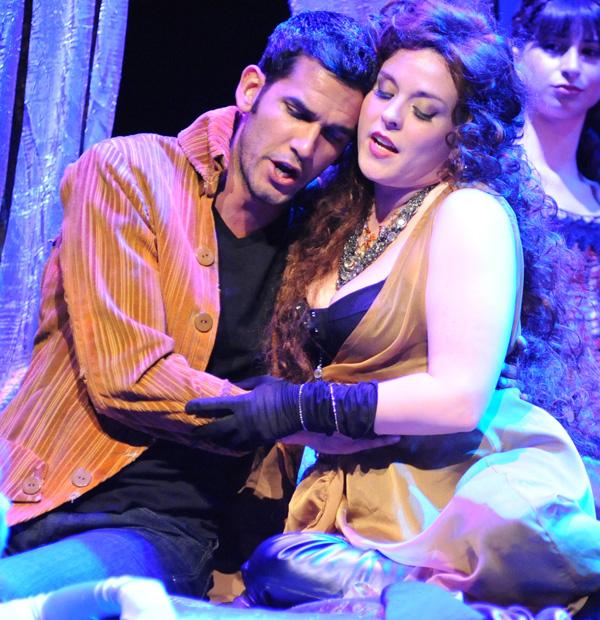The “Tales of Hoffmann” by the Cal State Long Beach Opera Institute is nothing short of a theatrical masterpiece of epic proportions. A stunning combination of visual effects and exquisite musicality, the performance that played last weekend in the University Theater transports the audience to the disjointed mind of the poet Hoffmann, played with heartbreaking conviction by Florentino Zarate.
The other star of the opera is the booming, looming Tyler Alessi, who seems to cast a dark shade over any scene he walks into. The towering man with a voice like a subway tunnel stands devil-like, about to close a deal over Hoffmann in each of his scenes. With a seething confidence, he makes his way through the opera and taunts the morose poet.
Taken out of its original bar scene, director Stephanie Valhos begins the opera with Hoffmann in a psychiatrist’s office as he faces his greatest threat — himself. This daring change allows for the story to be taken into the disjointed surrealism that is the human mind. The added modern English dialogue has been prepared in a way that seamlessly blends with a story that is set more than 150 years in the past.
What’s pleasantly surprising about the “Tales of Hoffmann” is the relatablity of Hoffmann to the average person. Viewers sympathize with the man whose first love, Olympia, played with seductive innocence by Megan Lyne, turns out to be a robot. Lyne expertly performs as a mechanical mistress, hitting her notes in a way that seems to defy human capability, lending credence to the idea that she is more than just human.
However, as first love is destined to end, a new relationship presents itself in the form of the lovely, sickly Antonia. It is important at this time to recognize the exceptional talents of J.J. Lopez, who, among the many other roles he plays during the opera, shines especially bright as Franz the butler. Lopez’s vaudevillian style of physical humor is a sharp contrast with his excellent singing ability.
Of all the scenes in “Tales of Hoffmann,” none will evoke as much sympathy from the audience as those between Hoffmann and Antonia. The maturity and depth of their love is something of an aspiration that few will ever have the audacity to attempt. The tragedy of Antonia is that her singing, which is the only connection she has to her dead mother, is killing her. Begged by her father and Hoffmann, she refrains from singing until the ghostly Dr. Miracle, played by a frighteningly sanitary Alessi, convinces her by conjuring up an image of her mother.
The joy of surrealism abounded during this act on the April 16 performance. Many in the audience were moved to tears because of Antonia’s death.
What is most tragic about Hoffmann is that time never allows him a moment to recover. Perhaps he never takes the time to make peace with the misfortunes that befall him. Either way, he finds himself again with a woman, or rather, a courtesan who plans to trade his reflection for a diamond. Mindi Ehrlich, who gives life to the tempting sexuality of Giulietta, uses her wiles to seduce Hoffmann out of his reflection and, in the process, finds herself damned.
By the end of the three tales, an emotionally drained Hoffmann is unable to recognize the latest object of his affection, originally a performer, she becomes his wife in the new interpretation.
What the “Tales of Hoffmann” teaches viewers is to not look back in anger. In fact, it suggests not looking back at all. The future may be unknown, but the past will most certainly bring pain.
Disclaimer: The Daily 49er is not responsible for comments made on www.daily49er.wpengine.com. Persons commenting are solely responsible for comments made on this Web site. The Daily 49er strongly advises individuals to not abuse their First Amendment rights, and to avoid language suggestive of hate speech.


